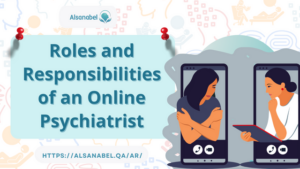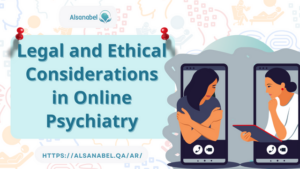Understanding the Role of an Online Psychiatrist 2024
- Category online psychiatric services
In today’s world, the option of seeking help from an online psychiatrist has opened up new possibilities for those looking to address their mental health concerns. By understanding the role of an online psychiatrist, individuals can access professional help and treatment in a way that suits their unique needs and circumstances. Let’s delve into the world of online psychiatry and explore its benefits and differences from traditional psychiatric care.
Roles and Responsibilities of an Online Psychiatrist
The roles and responsibilities of an online psychiatrist include:

- Assessment and Diagnosis: Conducting thorough evaluations to understand patients’ mental health issues and provide accurate diagnoses.
- Treatment Planning: Creating personalized treatment plans that may involve medication management, psychotherapy, or a combination of both.
- Therapeutic Interventions: Delivering evidence-based psychotherapy interventions through virtual sessions.
- Medication Management: Prescribing and monitoring psychiatric medications, adjusting dosages, and addressing any side effects.
- Crisis Intervention: Providing immediate support and intervention during mental health emergencies.
- Collaboration: Coordinating care with other healthcare providers to ensure comprehensive treatment approaches.
- Patient Education: Offering information and guidance to patients and their families about mental health conditions and treatment options.
- Documentation: Maintaining accurate and confidential medical records of patient assessments, treatment plans, and progress notes.
- Ethical and Legal Compliance: Adhering to professional ethical standards and legal regulations governing telepsychiatry practice.
- Continuing Education: Engaging in ongoing professional development to stay updated on advancements in psychiatric practice.
- Quality Improvement: Participating in initiatives to enhance the effectiveness and accessibility of online psychiatric services.
- Cultural Competence: Demonstrating sensitivity and competence in working with diverse patient populations.
These responsibilities ensure that online psychiatrists deliver effective, patient-centered care while upholding ethical standards and legal obligations.
Benefits of Seeing an Online Psychiatrist
Seeing an online psychiatrist offers several benefits:
- Convenience: Patients can access mental health care from the comfort of their own homes, eliminating the need for travel and reducing time spent in waiting rooms.
- Accessibility: Online psychiatry increases access to mental health services, particularly for individuals living in remote areas or those with mobility issues who may struggle to access traditional in-person care.
- Flexibility: Online appointments offer greater flexibility in scheduling, allowing patients to book appointments outside of traditional office hours and fit treatment into their busy schedules more easily.
- Privacy: Patients may feel more comfortable discussing sensitive issues in the privacy of their own homes, leading to increased openness and honesty during therapy sessions.
- Reduced Stigma: Online psychiatry can help reduce the stigma associated with seeking mental health treatment by providing a discreet and confidential way to access care.
- Continuity of Care: For individuals who travel frequently or have difficulty attending in-person appointments regularly, online psychiatry provides continuity of care, ensuring consistent access to treatment.
- Cost Savings: Online psychiatry may be more cost-effective for both patients and providers, as it eliminates overhead costs associated with maintaining a physical office space.
Overall, seeing an online psychiatrist offers convenience, accessibility, flexibility, privacy, and cost savings, making mental health care more accessible and convenient for a wider range of individuals.
Technological Tools and Platforms Used by Online Psychiatrists
Online psychiatrists utilize various technological tools and platforms to deliver effective care:
- Teleconferencing Software: Platforms like Zoom, Skype, or Doxy.me enable secure video conferencing for virtual sessions, allowing psychiatrists to conduct assessments and therapy sessions remotely.
- Electronic Health Records (EHR): EHR systems facilitate documentation of patient information, treatment plans, and progress notes, ensuring continuity of care and HIPAA compliance.
- Messaging and Chat Apps: Secure messaging apps like Signal or encrypted email services enable asynchronous communication between psychiatrists and patients for non-urgent inquiries or follow-ups.
- Virtual Whiteboards: Tools like Miro or Microsoft Whiteboard facilitate collaborative note-taking and visual aids during therapy sessions, enhancing engagement and clarity.
- Mobile Apps: Psychiatrists may recommend mental health apps to supplement treatment, offering resources for meditation, mood tracking, or psychoeducation to support patients between sessions.
- Telepsychiatry Platforms: Dedicated telepsychiatry platforms like Regroup or Amwell provide comprehensive solutions for online psychiatry, including scheduling, billing, and secure video conferencing tailored to mental health care.
- Digital Assessment Tools: Online psychiatrists utilize digital assessment instruments for screening, diagnostic evaluation, and outcome monitoring, streamlining the assessment process and enhancing accuracy.
By leveraging these technological tools and platforms, online psychiatrists can deliver accessible, convenient, and high-quality mental health care to their patients.
Training and Qualifications for Online Psychiatrists
Training and qualifications for online psychiatrists involve several key steps:
- Medical Education: Completion of a bachelor’s degree followed by four years of medical school to earn an MD or DO degree.
- Residency Training: Four-year residency training in psychiatry, gaining hands-on experience in diagnosing and treating mental health conditions.
- Licensure: Obtaining a medical license to practice independently, usually by passing licensing exams such as the USMLE.
- Board Certification: Optional board certification through exams like the ABPN, demonstrating expertise in psychiatry.
- Telepsychiatry Training: Some pursue additional training in telepsychiatry to navigate virtual assessments and ethical considerations.
- Continuing Education: Engaging in ongoing education to stay updated on advancements in psychiatry and telemedicine.
- State Licensure and Credentialing: Compliance with state licensure requirements and credentialing processes for telepsychiatry practice.
These steps ensure that online psychiatrists deliver high-quality care to patients in virtual settings.
Legal and Ethical Considerations in Online Psychiatry
Legal and ethical considerations in online psychiatry are vital for safeguarding patient safety, privacy, and care quality. Here are the key points:

- Licensing and Jurisdiction: Psychiatrists need to be licensed where patients reside, respecting laws and regulations. They should be aware of limitations on practicing across borders.
- Informed Consent: Providers must obtain informed consent from patients, detailing risks, benefits, and limitations of telepsychiatry. Patients should know about privacy protections and potential technological issues.
- Privacy and Security: Maintaining patient confidentiality and data security is crucial. Providers should use secure platforms to prevent unauthorized access or privacy breaches.
- Confidentiality: Providers must ensure patient confidentiality during sessions, disclosing limits and situations requiring breach, like imminent harm to self or others.
- Emergency Situations: Protocols for managing psychiatric emergencies during online sessions are necessary. This includes assessing risk and facilitating timely access to emergency services.
- Cultural Competence: Providers should be culturally sensitive, understanding how cultural factors influence patient-provider dynamics and treatment outcomes.
- Continuity of Care: Maintaining accurate medical records, coordinating care with other providers, and facilitating follow-up and referrals ensure continuity of care.
- Professional Boundaries: Providers must establish and maintain appropriate professional boundaries online, avoiding dual relationships and inappropriate behavior.
Adhering to these considerations ensures safe, ethical, and effective delivery of online psychiatry services, maintaining high standards of patient care and professionalism.
I hope this blog has provided you with a better understanding of the important role that online psychiatrists play in providing mental health care. If you have any questions or would like to share your own experiences with online psychiatric services, please feel free to leave a comment below. Remember, taking care of your mental health is just as important as taking care of your physical health. Thank you for reading.









